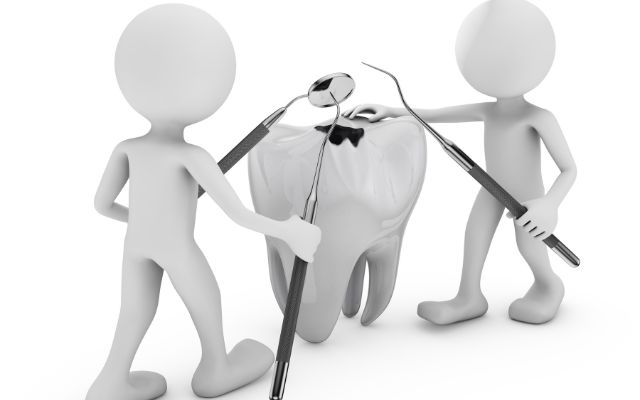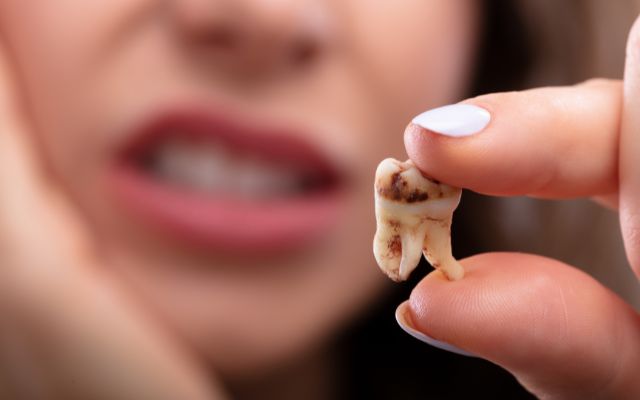Tooth Decay: Tiny gaps or holes form in the enamel of your teeth as a result of areas of persistent damage. This article will provide you the instructions about the signals, causes as well as some measures for preventing them.
Let’s get started!
Overview of Tooth Decay


Tooth decay, also known as cavities or caries, occurs when small gaps or holes develop in the enamel of your teeth due to ongoing damage. This condition can be attributed to various factors, including oral bacteria, frequent consumption of sugary beverages, and inadequate oral hygiene.
Tooth decay and cavities are widespread dental issues, affecting individuals of all ages. They are particularly common among children, teenagers, and older adults. Neglecting cavities can lead to their expansion into deeper layers of the tooth, potentially causing pain, infection, and even tooth loss.
If cavities are not treated, they become larger and spread to deeper tooth layers. They may result in discomfort, infection, and tooth loss. Regular dental appointments and proper brushing and flossing routines are your best defense against tooth decay and cavities.
Symptoms of Tooth Decay


The indications and symptoms of cavities can vary widely depending on the severity of the cavities and where they are located. It’s possible that you won’t experience any symptoms at all while a cavity is first starting out. As the deterioration spreads, it may result in a variety of indications and symptoms, including the following:
- Toothache, spontaneous pain, or pain that happens for no apparent reason are examples of types of pain.
- Sensitivity of the teeth
- Varying degrees of discomfort brought on by consuming something sweet, hot, or cold when eating or drinking.
- Visible fissures or holes in the enamel of your teeth
- Discoloration of any tooth surface, whether brown, black, or white in color
- The discomfort was experienced when biting down.
NOTE: It’s possible that you are unaware that a cavity is developing in your tooth. Even if your mouth does not feel uncomfortable, you should still go in for routine dental exams and cleanings at least twice a year.
However, if you have a toothache or pain in your mouth, you should make an appointment with your dentist as soon as you can.
Tooth Decay Reasons


Cavities are created by tooth decay, which is a gradual process. How does tooth decay develop?
Plaque Shapes
Plaque is a transparent, sticky film that coats the teeth. It is caused by consuming a lot of carbohydrates and carbs and not properly cleaning your teeth. When sugars and starches are not removed from the teeth, plaque forms rapidly as bacteria feed on them.
Plaque that remains on the teeth can become tartar under or above the gum line (calculus). Tartar makes plaque removal more difficult and provides microorganisms with a protective barrier.
Plaque Attacks
The plaque acids destroy minerals from the hard, outer enamel of your teeth. This erosion results in microscopic gaps or holes in the enamel, which is the initial stage of tooth decay. Once the enamel has been worn away, bacteria and acid can reach the dentin, the next layer of your teeth.
This layer is softer and less resistant to acid than enamel. Dentin contains microscopic tubes that communicate directly with the tooth’s nerve, generating sensitivity.
Destruction Continues
As tooth decay progresses, bacteria and acid continue their march through your teeth, approaching the pulp, which contains nerves and blood vessels.
The bacteria cause swelling and irritation of the pulp. Since there is no room for the swelling to develop within a tooth, the nerve becomes compressed and causes discomfort. Pain can extend beyond the tooth root and into the bone.
Risk Factors of Tooth Decay


Everyone with teeth is susceptible to developing cavities, but the following conditions can enhance the likelihood:
Dental position
Decay most commonly affects the rear teeth (molars and premolars). These teeth have numerous pits, crevices, and grooves, as well as various roots that can capture food particles. As a result, they are more difficult to clean than your front teeth, which are smoother and easier to reach.
Some foods and beverages
Milk, ice cream, honey, sugar, soda, dried fruit, cake, cookies, hard candies and mints, dry cereal, and chips are more prone to induce tooth decay than items that are quickly removed by saliva.
Constant munching or drinking
When you consistently consume sugary snacks and beverages, you provide oral bacteria with additional fuel to make acids that erode your teeth. Drinking soda or other acidic beverages throughout the day contributes to a constant acid bath on the teeth.
Feeding an infant before bedtime.
When infants are given goodnight bottles containing milk, formula, juice, or other sugar-rich liquids, the liquids linger on their teeth for hours, feeding cavity-causing germs. This injury is frequently referred to as baby bottle teeth rot. When toddlers wander around drinking from sippy cups containing these beverages, comparable damage can occur.
Insufficient Brushing
If you don’t brush your teeth immediately after eating and drinking, plaque develops rapidly and the early stages of tooth decay can begin to develop.
Not getting enough fluorine. Fluoride, a naturally occurring mineral, can reverse the earliest stages of tooth decay. Due to its dental benefits, fluoride is added to numerous public water systems. Additionally, it is a typical component in toothpaste and mouthwash. However, bottled water does not typically contain fluoride.Younger or Older Age
Cavities are widespread in very young toddlers and adolescents in the United States. Older folks also are at higher risk. Teeth can wear down and gums can recede over time, rendering teeth more susceptible to root decay. Additionally, older persons may be more likely to use drugs that lower saliva production, hence raising the risk of tooth decay.
The mouth is dry
A lack of saliva causes dry mouth, which helps prevent tooth decay by removing food and plaque from the teeth. Additionally, substances contained in saliva help neutralize the acid produced by bacteria. By decreasing saliva production, certain medications, medical conditions, radiation to the head or neck, and certain chemotherapy drugs might increase the risk of cavities.
Ways to prevent Tooth Decay


Good oral and dental hygiene can prevent tooth decay and cavities. Here are some tips for cavity prevention. Ask your dentist for the best dental care suggestions.
- Use toothpaste with fluoride after eating or drinking. Using fluoride-containing toothpaste, brush your teeth at least twice a day preferably after each meal. Use floss or an interdental cleaner to clean the spaces between your teeth.
- Rinse your mouth with water. If your dentist believes you have a high risk of acquiring cavities, he or she may advise you to use a fluoride-containing mouth rinse.
- Visit the dentist frequently. Regular professional tooth cleaning and oral examinations can help avoid or detect problems. Your dentist can propose the ideal schedule for you.
- Drink some tap water. Most public water supplies include fluoride, which can dramatically reduce tooth decay. If you exclusively consume fluoride-free bottled water, you will miss out on its health benefits.
- Avoid munching and drinking frequently. When you consume foods or beverages other than water, you encourage oral bacteria to produce acids that can erode tooth enamel. If you snack and drink frequently throughout the day, your teeth are constantly under attack.
- Consume tooth-friendly meals. Some meals and beverages are more beneficial to dental health than others. Avoid meals that linger in the grooves and pits of your teeth, or brush as quickly as possible after eating them. However, foods such as fresh fruits and vegetables enhance saliva production, and beverages such as unsweetened coffee, tea, and sugar-free gum assist in the removal of food particles.
- Consider fluoride treatments. If you aren’t getting enough fluoride from fluoridated water and other sources, your dentist may recommend periodic fluoride treatments. If your risk of tooth decay is extremely high, he or she may additionally propose that you use custom-made trays to apply prescription fluoride.
FAQs
How long does it take for a dental bone transplant to heal?
Although you’ll likely feel better in a week or two, full dental bone transplant healing can take three to nine months, and perhaps longer. The type of graft, the location where the graft was put, and your body’s ability to mend all affect how long it takes to recover.
What are the phases of healing for a dental bone graft?
Each person’s recovery period might be highly different, your dentist will keep an eye on your recovery after the bone transplant has been applied. When your new bone is strong enough to sustain the implant, they will let you know if you are ready to have dental implant surgery.
>> Tooth Decay Treatment In Bassendean, Perth
Early Intervention Works Best
At Spring Orchid Dental, we offer multiple ways to halt tooth decay in its early stages. Options like varnishes, fluoride gels, or pastes can be applied to the affected teeth. For best results, cutting down on sugar is recommended.
If a cavity is detected, our skilled team at Spring Orchid Dental will expertly remove the decayed area and fill your tooth. Choose from natural-looking composite resin or ultra-durable milled porcelain for your filling.
Severe Tooth Decay Treatment
For severe cases where the tooth is irreversibly damaged, extraction may be the only option. We can then replace the missing tooth with a high-quality dental implant or bridge.
No matter the stage of tooth decay you’re experiencing, prompt attention is crucial. Following your dentist’s advice and returning for scheduled follow-ups will ensure your teeth remain healthy. Early intervention can prevent further deterioration.
Don’t hesitate—if you’re experiencing signs of tooth decay or just want a dental check-up, book an appointment with our Bassendean dentist today.





